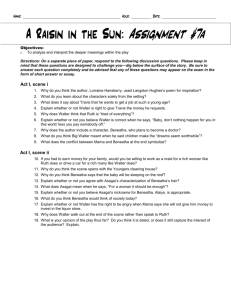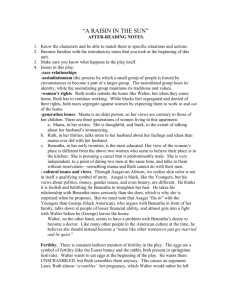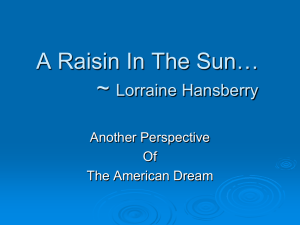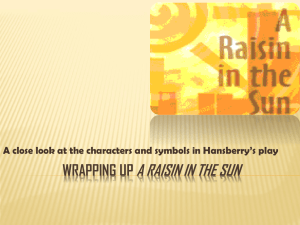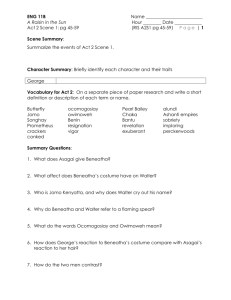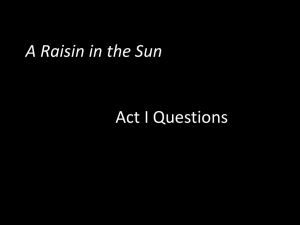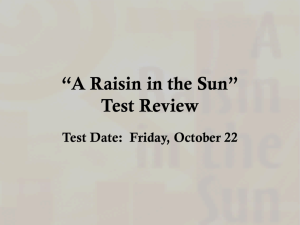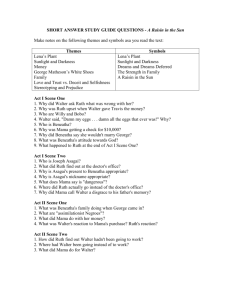A Raisin in the Sun
advertisement
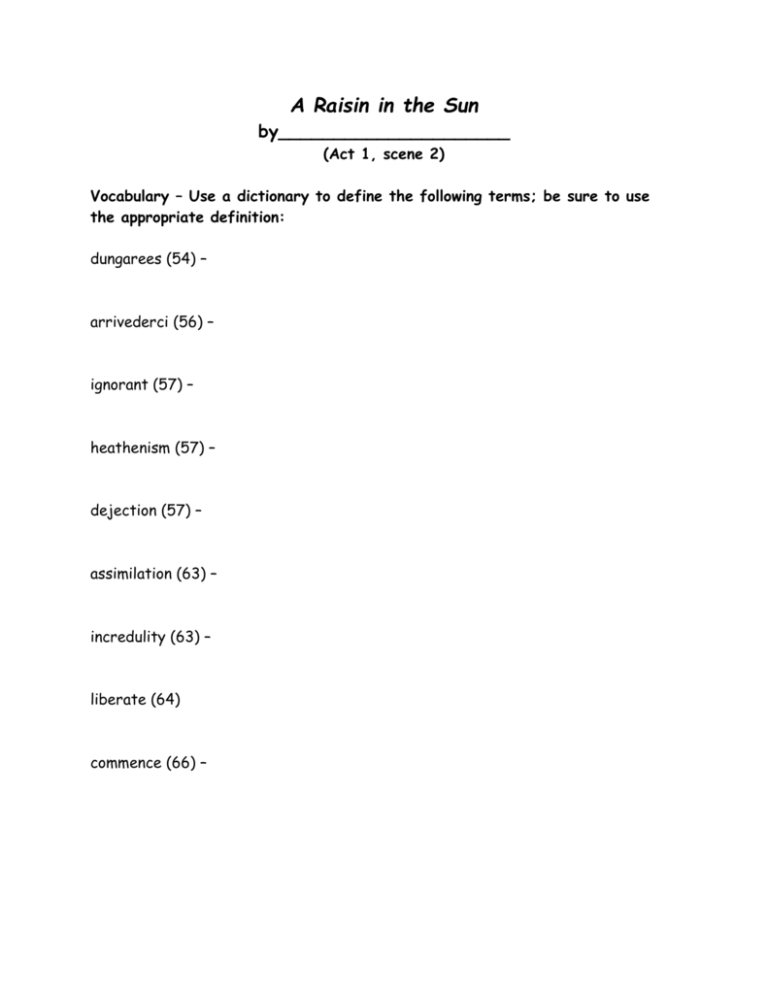
A Raisin in the Sun by_____________________ (Act 1, scene 2) Vocabulary – Use a dictionary to define the following terms; be sure to use the appropriate definition: dungarees (54) – arrivederci (56) – ignorant (57) – heathenism (57) – dejection (57) – assimilation (63) – incredulity (63) – liberate (64) commence (66) – Characters – Define each character in terms of who he/she is in the play AND his/her personality. Asagai – - Reading Questions 1. What is the setting (time/place)? 2. What are Mama and Beneatha doing when the scene opens? 3. On page 56, Mama and Beneatha exchange a glance that only women would understand, what does this action forshadow to the reader concerning Ruth? 4. Who is Asagai? Where is he from? (page 56) 5. In what way is Beneatha ashamed of her family? (page 57) 6. Why does Mama feel there’s no reason for her to know anything about Africa? (page 57) Why might this bother the modern reader or someone like Beneatha? 7. The stage directions on page 57 tell us that Ruth enters “forlornly” and that she “pulls off her coat with dejection.” What assumption does this confirm for Mama and Ruth? 8. Why are Beneath and Ruth not excited about another child in the family? Why is Mama excited? 9. How does Mama treat Beneatha like a child on page 58? 10. Why does Mama become suspicious of Ruth’s “doctor appointment”? (page 59) 11. Ruth is, quite obviously, extremely dismayed by the pregnancy. How does Mama try to blow off her concerns? On what does she attempt to blame her anxiety? (page60) 12. What is the difference between Asagai’s and Beneatha’s feelings for one another? 13. About what part of Asagai’s gift is Beneatha most excited? (page 61) Why? 14. Of what does Asagai remind Beneatha concerning the first time they met? (page 62) What does this say about Beneatha’s personality? What does Asagai mean when he says, “Assimilationism is so popular in your country”? (page 63) 15. What does Asagai mean by “For a woman it should be enough”? (page 64) Is Asagai more like Beneatha or more like Mama? Explain. 16. In what way does Asagai claim that American women are all the same? (page 64) In what way(s) is he right or wrong? 17. What does Asagai mean by “It’s how you know the world’s most liberated women are liberated at all.” How is he right or wrong? 18. What nickname does Asagai call Beneatha? What does he tell her this name means? How would you explain his translation? 19. What does Mama think about Asagai? (pages 64-66) --------------------------------------------------------------------------------------------- 20. When she opens the envelope and reveals the check, Mama says, “Ten thousand dollars they give you.” (page 69). Whom does she mean by “they”? Why does she become upset at finally getting the money? 21. Whom does Mama mean by “that woman” when she talks to Ruth about her doctor visit? What does she think Ruth is planning to do? (page 70) 22. Walter Lee’s exclamation, “WILL SOMEBODY PLEASE LISTEN TO ME TODAY!” tells us what about his inner struggle? (page 70) 23. How would you characterize Walter Lee’s behavior on pages 70-71? In what way does Mama treat him appropriately then? 24. Mama says to Walter Lee, “Something eating you up like a crazy man.” What is “eating” at him? (page 72) 25. According to Mama, what happens “When a man goes outside his home to look for peace”? (page 73) 26. Why does Walter Lee view his job as “nothing at all”? (page 73) 27. Mama says, “Once upon a time freedom used to be life--now it’s money.” What is she inferring? (page 74) 28. For what reason does Mama think Ruth is planning to abort her pregnancy? (page 75) 29. Why does Mama tell Walter Lee he’s “a disgrace to” his “father’s memory”? (page 75) 30. Do you believe Walter Lee really does want Ruth to abort the pregnancy? If so, why? If not, why does he leave and not talk to her?
